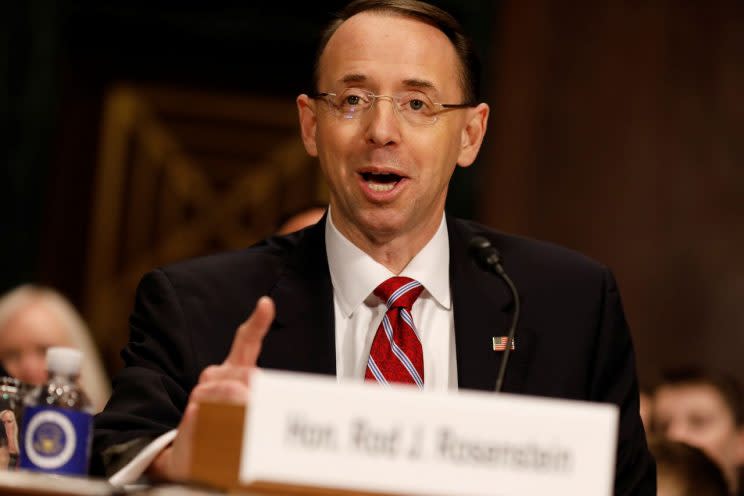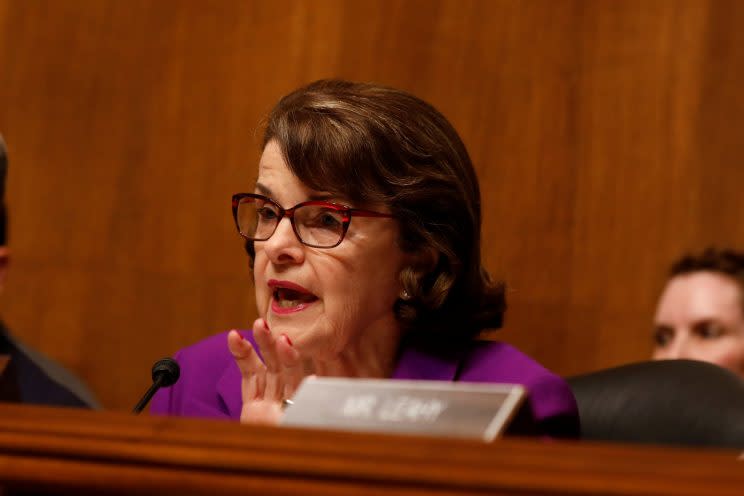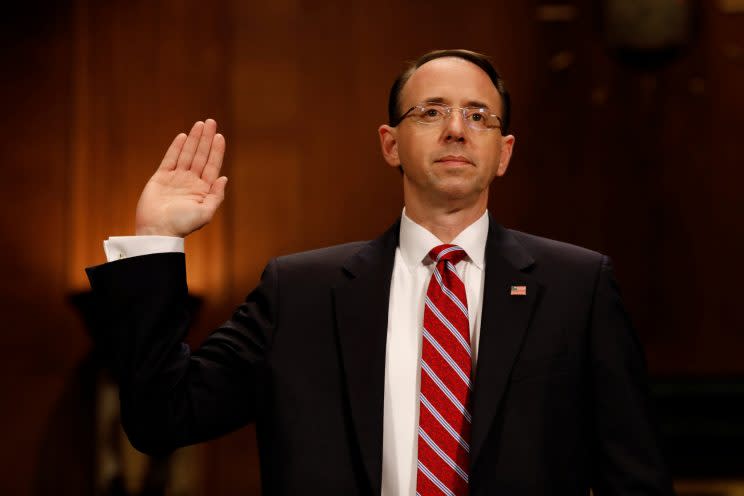Senate Democrats grill key Trump Justice Dept. pick about Russia

WASHINGTON — Democrats on the Senate Judiciary Committee failed on Tuesday to gain assurances from Rod Rosenstein, President Trump’s nominee for deputy attorney general, that he would appoint a special prosecutor to investigate Russia’s influence in the 2016 election if he’s confirmed.
Rosenstein, the U.S. attorney for Maryland, told the committee that he was only familiar with allegations of Russian meddling through media reports, and would need to know more before making a decision on a special prosecutor based on Justice Department protocol. But he assured senators he would be on “the Americans’ side” if evidence showed that Russian inappropriately interfered in the election.
If confirmed, Rosenstein would be No. 2 at the Justice Department and in charge of any investigation into the Trump campaign’s ties to Russia, given Attorney General Jeff Sessions’ announcement last week that he would recuse himself from matters involving the Trump campaign. Sessions’ recusal came after revelations that he had met twice with the Russian ambassador during Trump’s campaign, despite testifying under oath during his confirmation hearing that he had had no contacts with Russians. Trump’s former national security adviser, retired Lt. Gen. Mike Flynn, resigned last month after it was revealed that he talked to the Russian ambassador and discussed sanctions that President Barack Obama had leveled against the Kremlin for interfering in the U.S. election.
Sen. Dianne Feinstein, D-Calif., called for a special prosecutor free from partisan influence to investigate the claims about Russian interference in the election. The New York Times reported in January that federal law enforcement officers were investigating contacts Trump associates had with Russian officials during the campaign.
“To be clear, I do not say this because I question the integrity or the ability of Mr. Rosenstein,” Feinstein said. “I do not. But this is about more than one individual. This is about the integrity of the process.”

Rosenstein, who was introduced to the committee by his home state’s two Democratic senators, told the committee he did not know enough about the claims to make a decision on the question of a special prosecutor. He said he was not even aware whether there is an ongoing Justice Department investigation of the matter. (The Senate Intelligence Committee is investigating the claims about Russia, but the Justice Department does not comment one way or the other on ongoing probes.) Rosenstein added that he believed all of the Justice Department’s investigations are “independent” and free from political influence.
“I would need to familiarize myself with the facts,” he said.
Democratic senators attempted repeatedly, without success, to get Rosenstein to commit to appointing a special prosecutor.
“How can you investigate your boss?” Sen. Dick Blumenthal, D-Conn, asked him, referring to Sessions.
Rosenstein answered that he would have no problem questioning the attorney general if an investigation led him there, and said that he questioned a U.S. president in a previous case. He said he considered it a matter of “principle” not to commit to handle a potential case a certain way in his confirmation process, since it would set a bad precedent for future prosecutors. No one from the White House had contacted him about the inquiry, he added.
“If all the shop windows are broken on Main Street, is it appropriate for the police chief to assure the public that he’s going to get to the bottom of it?” asked Sen. Sheldon Whitehouse, D-R.I.
Rosenstein said that barring a hurricane, it would be appropriate. Whitehouse then asked if the intelligence community’s findings on Russia were not the equivalent of broken windows on Main Street, making it law enforcement’s responsibility to assure the American public they would get to the bottom of it.

“Senator, I believe you and I are on the same side,” Rosenstein responded. “If the Russians interfered with the American elections, I’m on the Americans’ side.”
Several Democratic senators urged Rosenstein to read the declassified report on Russia’s interference in the U.S. election. The U.S. intelligence community alleges that Kremlin-backed cyberattacks led to the massive email leaks that plagued the Democratic National Committee and Hillary Clinton’s team during the campaign.
Rosenstein said he was only familiar with the allegations through media reports. Sen. Al Franken, D-Minn., said it was “very disturbing” that Rosenstein had not yet read it, and Sen. Dick Durbin, D-Ill., read portions of it out loud to the nominee.
Franken and the committee chairman, Sen. Chuck Grassley, R-Iowa, got into a tense exchange during the hearing, after Franken called on Sessions to return to the committee and correct his earlier testimony, in which, under oath, he incorrectly said that he had no contact with Russians during Trump’s campaign.
“He should come back and explain himself to us, Mr. Chairman,” Franken said. “I think he owes that to us.”
Grassley raised his voice, calling Franken’s original question to Sessions a “gotcha” question. He then banged his gavel and returned to the hearing.
Read more from Yahoo News:


